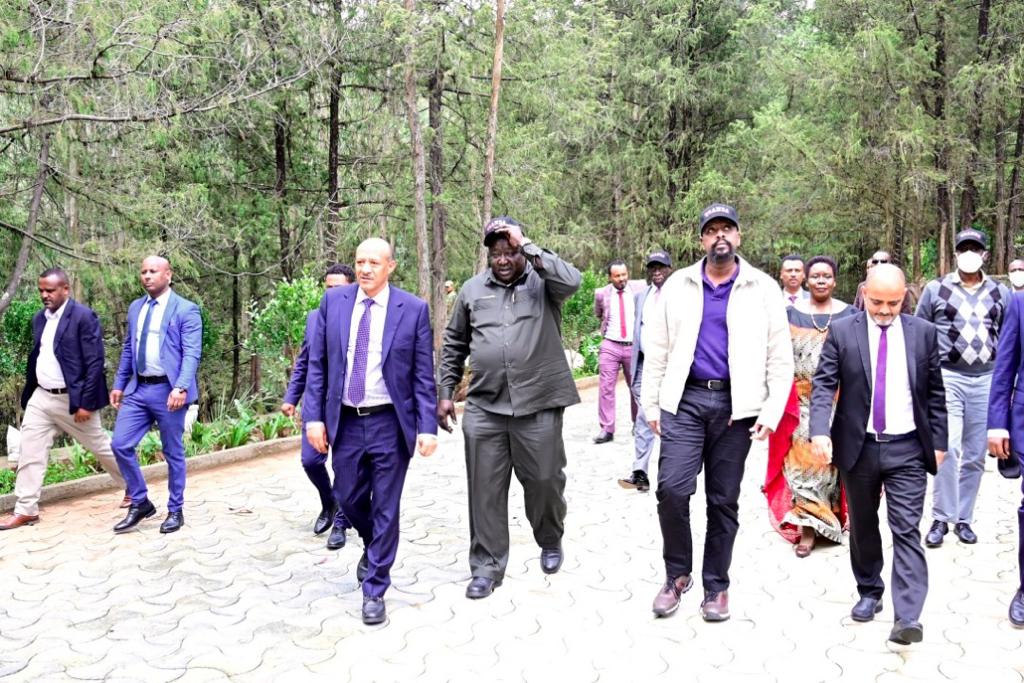The UPDF Commander Land Forces, Lt Gen Muhoozi Kainerugaba has on Sunday arrived in Addis Ababa, Ethiopia ahead of his scheduled meeting with the country’s Prime Minister, Dr Abiy Ahmed.
On Friday, reports emerged that the government of Ethiopia had invited Gen Muhoozi, who is also Senior Presidential Advisor in charge of Special Operations, to visit Ethiopia.
The reports were confirmed by Land Forces spokesperson, Lt Col Chris Magezi who said that, “Gen Muhoozi will be going to Addis Ababa at the invitation of the government there.”
He however did not specify the exact day for the meeting and matters to be discussed.
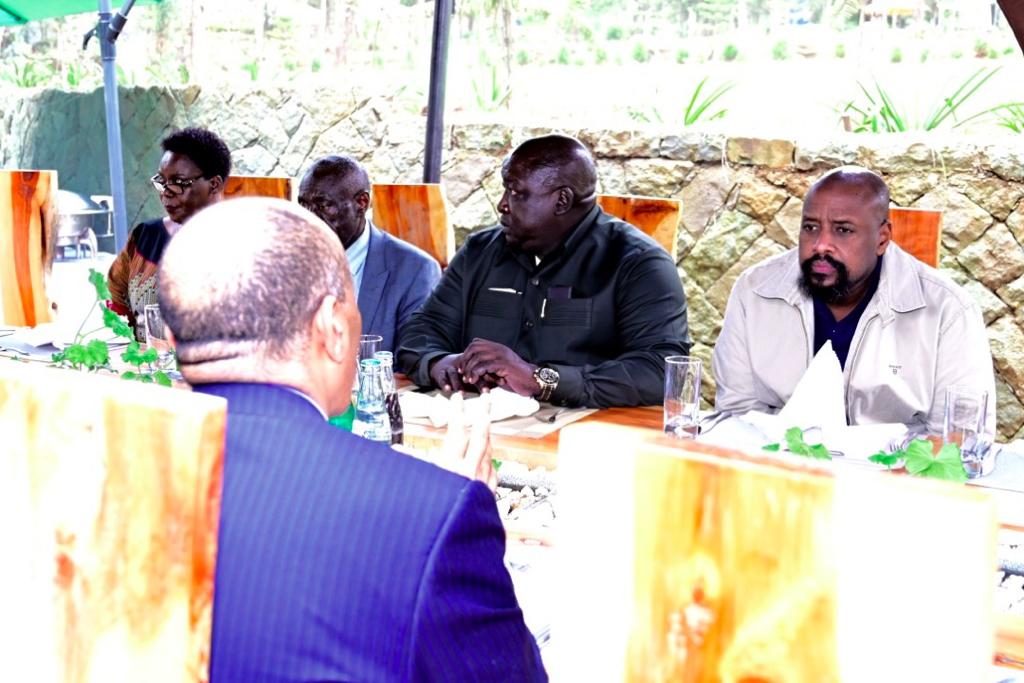
We have now learned that Gen Muhoozi, in company of State Minister for Foreign Affairs, Okello Oryem traveled to Ethiopia today Sunday afternoon.
Others on his delegation include Director External Security Organisation (ESO), Amb Joseph Ocwet and his Military Assistant, Col Mcdans Kamugira.
At Bole International Airport, Gen Muhoozi was received by Uganda’s Ambassador to Ethiopia, Rebecca Amuge Otengo, Uganda’s Defense Advisor to Ethiopia, Col Fred Zakye and high level Ethiopian officials led by the National Intelligence and Security Service (NISS) Director-General, Temesgen Tiruneh and his deputies Sisey Tola and Tazer Gebreegziabher.
Gen Muhoozi and PM Ahmed are expected to discuss among other issues regional security.
On Saturday, Muhoozi said the stability of East Africa depends on two countries – Ethiopia and Uganda.
“The River Nile begins from these two mothers of Africa. I am going to Ethiopia to try and bring understanding between us.”
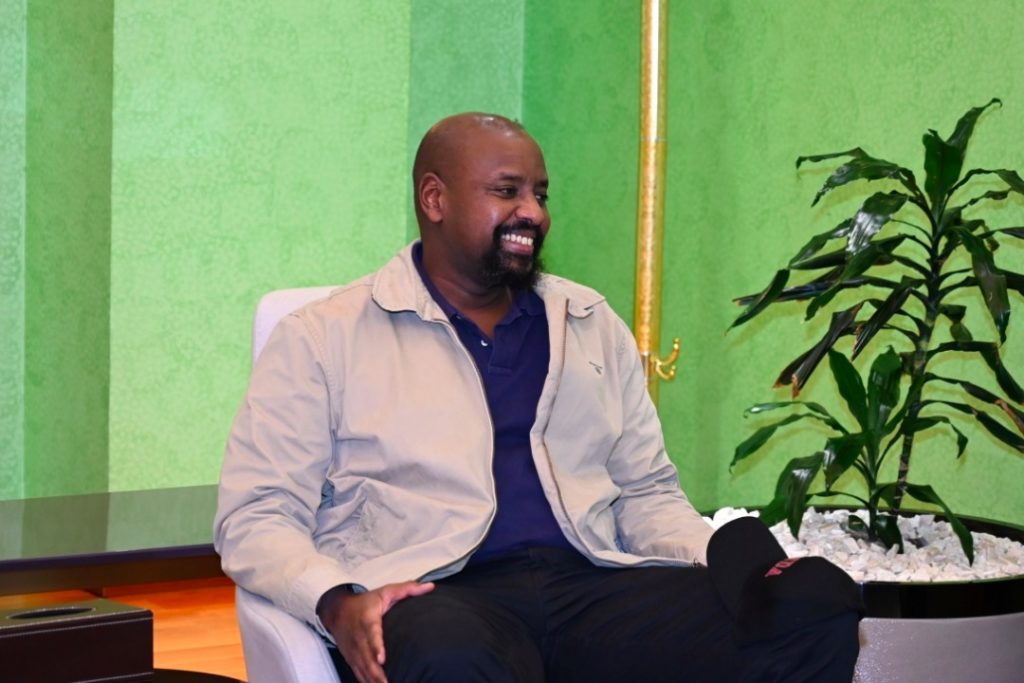
Gen Muhoozi has previously used his socials to voice strong views on developments in Ethiopia particularly in the Northern part of the country – Tigray region.
This week, Muhoozi said he has “never had a problem with my brother, His Excellency Abiy Ahmed, in fact I respect him.”
“All we want is peace in Ethiopia,” Gen Muhoozi noted.
Restoring peace in Tigray
The Federal government of Ethiopia has severally openly stated that it is open to any engagement leading to resolving the conflict. In March this year, it declared an indefinite humanitarian truce to facilitate the free flow of humanitarian aid into Tigray region.
While announcing the humanitarian truce, government said thousands of people from Tigray were trekking into neighboring regions in search for assistance.
Considering this fact, government said, the situation warranted urgent measures to assist the locals, thus committing to exert maximum effort to facilitate the free flow of the needed aid.
This, happened at the backdrop of the fact that TPLF uses starvation through interrupting with the flow of humanitarian support into the Northern region, stealing the ready to harvest food and consuming the stockpiled one.
Much as government asked TPLF to desist from acts of aggression and withdraw from areas they occupied in neighboring regions, no signs of such were seen. TPLF still occupies some areas in Afar and Amhara regions.
They, on several occasions, commandeered humanitarian vehicles that entered Mekelle. It is also worth noting that the group the group also rejected to observe the government declared Unilateral Ceasefire in June 2021.
In other words, the belief that continued fighting in Tigray and neighbouring regions would Ethiopia force Addis Ababa to succumb and give in to the North is frustrating all the possible negotiations.
Current situation and negotiations
At the end of July this year, the UN special envoys and Ambassadors from EU, USA, France, Germany, Italy and UK, Redwan Hussein visited the country where Prime Minister, Abiy Ahmed said Ethiopia was ready to negotiate with TPLF without any preconditions. Addis Ababa had demanded the TPLF forces to lay arms if any negotiation is to take place with the government.
But on its part, TPLF insists Ethiopian Forces should first withdraw from Tigray region as well and also restore banking and communication services or else return to war.
Ethiopia is pushing for the AU to lead the negotiations and indeed AU’s Horn of Africa envoy Olusegun Obasanjo has been leading a diplomatic push to end the conflict but TPLF want Kenya’s President Uhuru Kenyatta, who has been actively involved in peace efforts, to mediate between the two parties.
At the start of this Month, Obasanjo briefed the bloc’s Peace and Security Council on his progress in resolving the conflict.
The AU council called on the warring sides “to place the supreme interests of Ethiopia and its people above all else and embrace inclusive political dialogue as the only viable approach towards finding a consensual solution to the current situation.”
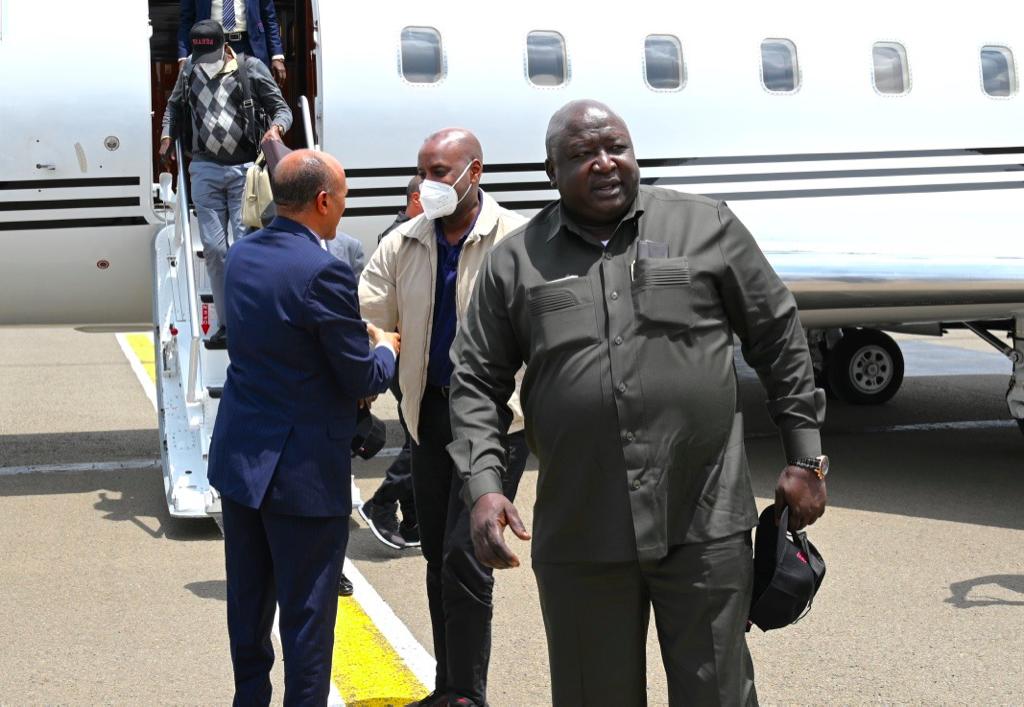
In January this year, Gen Muhoozi held talks with Ethiopia’s Ambassador to Uganda, H.E Alemtsehay Meseret on bilateral and regional issues of mutual interest.
During the meeting, they resolved to further strengthen the excellent cordial bilateral relations between the Republic of Uganda and Ethiopia.
They, according to Gen Muhoozi, “reaffirmed the solid and friendly relations between the two countries and also resolved to continue close cooperation in the pursuit of peace and security in our respective countries and in the region.”
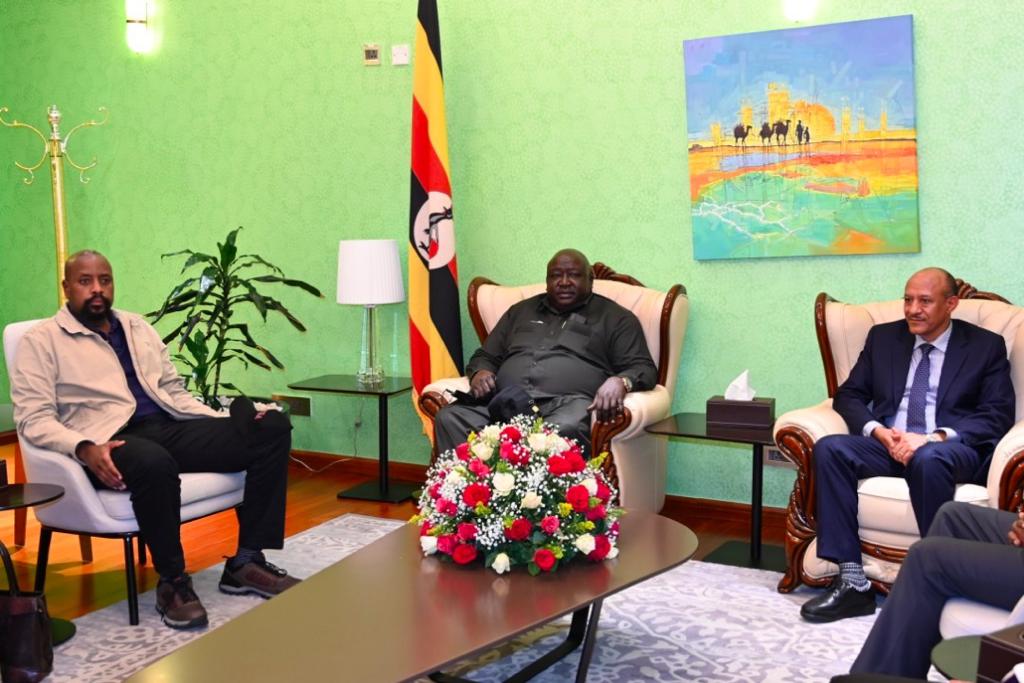
Ethiopia and Uganda enjoy longstanding cordial bilateral relations and have indeed cooperated in various peace processes in the region including contributing troops to keep peace in Somalia.
In August last year, Prime Minister of Ethiopia, Dr Abiy Ahmed agreed with President Yoweri Museveni to ‘walk together’ on matters regarding strengthening cooperation in bilateral, regional, and international issues of common interest.
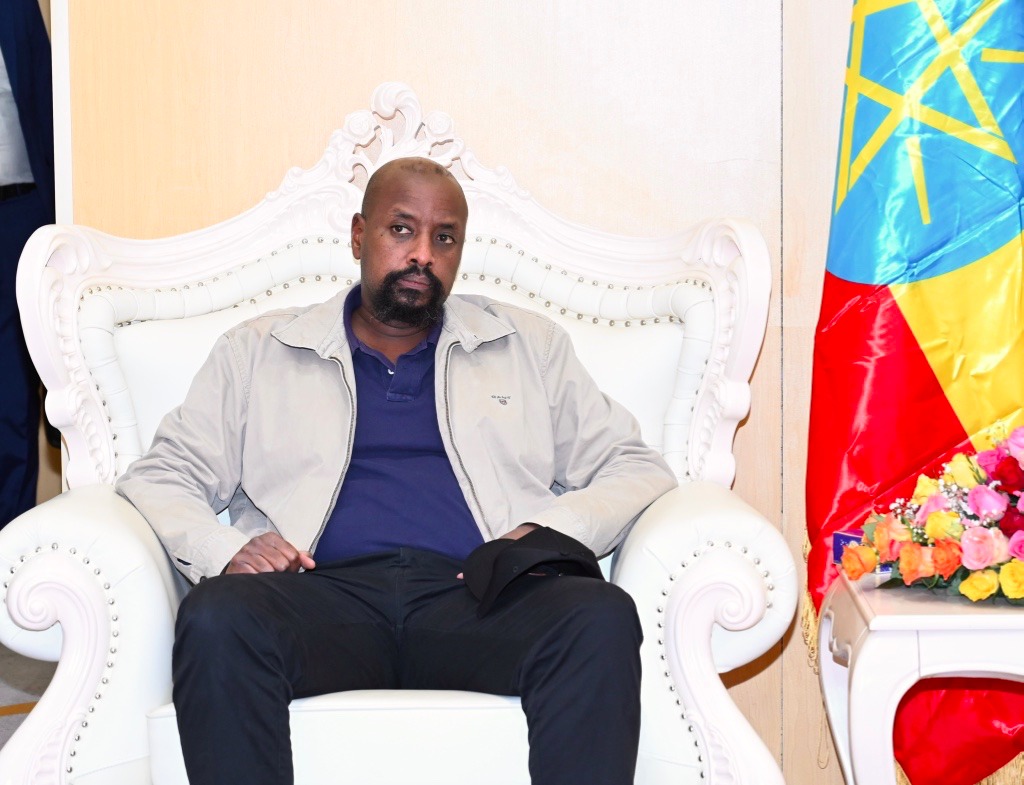
Gen Muhoozi’s trip to Ethiopia is happening at a time when Ethiopia is amplifying calls for Africa-led negotiations on the use of River Nile waters in order to build peace, cooperation, mutual co-existence and development of all our people without harming one another.
Last week, Ethiopia announced that electricity production had started at the second turbine of the Grand Ethiopian Renaissance Dam (GERD) and that the third consecutive filling of its reservoir was also successfully completed.
The GERD is the largest Hydroelectric project in Africa currently being constructed on the Blue Nile river, which is originated in Ethiopian highland, with a capacity of producing 5150 MW.
This third filling meant that the dam can run the first two of its 13 turbines. On completion, the $5-billion dam will produce more than 5,000 megawatts of electricity, making it Africa’s biggest hydroelectric dam and more than doubling Ethiopia’s electricity output.
However, the downstream countries – Egypt and Sudan have since 2011 when Ethiopia broke ground on the project, piled pressure on Addis Ababa to abandon the project.
Egypt and Sudan without any substantive justification, view the dam as a threat because of their dependence on Nile waters. They have further moved to frustrate talks held under the auspices of the African Union (AU) aimed at reaching a three-way agreement on the dam’s filling and operation.
Instead, they demand that Addis Ababa ceases to fill the massive reservoir until such a deal is reached.
Ethiopia, which has consistently called for open and unbiased discussions on the use of the Nile waters, insist that GERD’s filling is a natural part of the dam’s construction process and cannot be stopped.
At the start of this month, President Yoweri Museveni made a case for having a regional top-level leadership meeting on the usage of River Nile waters particularly on energy and irrigation.
“On the construction of the renaissance dam, I think we should have a top-level leadership meeting on the Nile, where we discuss the real issues; energy and irrigation,” Museveni said on Wednesday while hosting Ethiopia’s Ambassador to Uganda, H.E Alemtsehay Meseret Gelaw at State House, Entebbe.
In what seems to be a disapproval of Egypt’s claim that the construction of the dam reduced waters reaching it, the Ugandan leader said water was reduced by environmental changes.
“In any case, due to changes in the environment that led to the reduction of rain, the waters of the Nile had already reduced by 20bn cubic metres before reaching Egypt. These are the real issues and they have nothing to do with colonial treaties,” noted Museveni.

